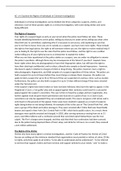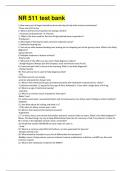Summary
Summary Criminology Unit 3: AC 1.4 write up model answer
- Module
- Crime Scene to Courtroom
- Institution
- WJEC
These are my answers that I used to achieve a near perfect 95/100 marks on the Year 13 Unit 3 Criminology controlled assessment. Of course, I changed it as needed during the exam, but these were the backbones of my answers. This resource covers AC 1.4. This detailed answer is well-developed after t...
[Show more]





